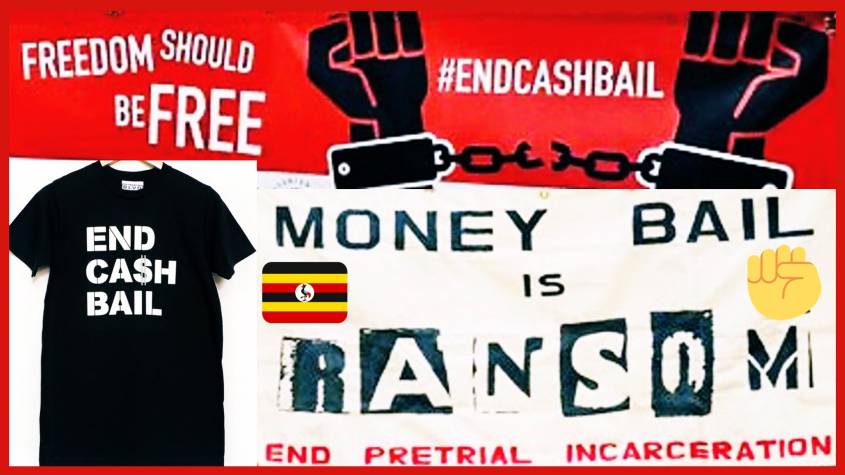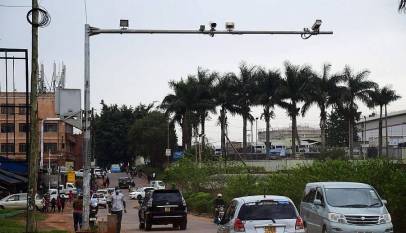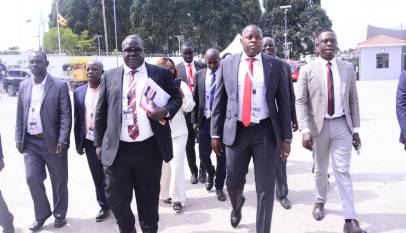Cash Bail to Remain says Constitutional Court
The Constitutional Court has unanimously dismissed a petition challenging the constitutionality of cash bail.
In a lead judgment written by Justice Florence Nakachwa, the court held that imposing a cash bond before an accused person is released on bail doesn’t in any way offend the Constitution.
“I hold that the imposition of cash bail is one of the legal considerations for bail and hence not inconsistent with or in contravention of any of the provisions of the Constitution… I find that payment of cash bail does not contravene any constitutional requirements for a fair trial. There are procedures ensuring a fair trial where the accused person feels aggrieved in a bail application. Banning cash bail would stifle the court’s discretion in bail applications. Had Parliament intended that bail bond be non-cash, it would have said so,” Nakachwa’s ruling reads in part.
Her decision arose out of a petition filed by three people; Kuuku Amos, a lawyer and human right advocate, Kasule Ezekiel an accused person granted a UGX 5million cash bail but failed to pay and spent 16months in prison and Kajubi Frank Barnabas also an accused person who was granted a UGX 900,000 cash bail but failed to raise the money and was kept in prison for three more days until he was able to pay.
In their petition, the three alleged that provisions of Section 78 (b) of the Magistrates Courts Act, Cap.16 and Guidelines 23, 24, 25, 26, 27 and 28 of the Constitution (Bail Guidelines for Courts of Judicature) (Practice) Directions, 2022, that seek to impose cash bail before an accused person is released on bail are unconstitutional as they contravene Articles 21, 23 (6) (a), (b) & (c); 28 (3) (a); and 126 (2) (a); 8A of the Constitution of Uganda and Principle No. XXVlll (i) (b) of the National Objectives and Directive Principles of State Policy.
In her ruling, Nakachwa said that although an accused person has a right to apply for bail, it does not necessarily follow that one is automatically entitled to it.
She added that the decision whether to grant or deny bail lies with the Magistrate or Judge before whom the accused person is appearing.
“Once the accused person exercises his or her right by applying for bail, the presiding Magistrate or Judge must weigh the arguments for and against the application and apply the law before he or she grants or denies the accused person bail. The test as to whether to grant bail or not should be whether the accused will turn up for trial or not and the circumstances of each case,” Nakachwa’s ruling reads in part.
She, however, noted that the discretion to grant or deny bail should be exercised judiciously by the judicial officer hearing a bail application to balance the accused person’s right to liberty with the need to ensure their appearance in court and to prevent obstruction of justice.
“The financial aspect of bail, including cash bail, serves as a deterrence against absconding, and it ensures the accused’s commitment to attending trial. It should not be viewed as a punishment for the accused person. So, the magistrate or judge should grant bail at a reasonable amount, bearing the circumstances of the case at hand,” Nakachwa said.
She also noted that the bail cash payment deters would-be criminal offenders from committing crimes if they know they would be required to pay money before they are released on bail.
“This financial pinch leads to obedience to the law and promotion of the rule of law. Delinquency has legal consequences. Where potential offenders know that there are no financial obligations before being released on bail, there is likely to be lawlessness and anarchy,” the judge held.
She also noted that even the bail cash is refunded at the end of the trial for as long as there is evidence that the money was paid.
“The Petitioners’ argument that billions of bail money lie unclaimed does not hold water. The 2nd Petitioner’s claim that he should be compensated because he disposed of property to raise the 5,000,000 shillings’ bail money is unattainable. As stated earlier, he can claim for refund of the money paid as a condition for bail at the conclusion of the criminal case,” Nakacwa’s ruling reads in part.
In his concurring decision, Justice Fredrick Egonda-Ntende noted that although the imposition of a cash bail is not unconstitutional per se, its wrong application may result in a particular decision of the court being unconstitutional.
He argued that the constitutional imperative is that the conditions for the release of a person must be reasonable on account of the offence a person is charged with.
“Where the court determines that an accused’s own recognisance is insufficient for the release of such a person on bail, and it must consider the deposit of an article, property, or money, the order made in relation to the deposit of an article, property, or money must be reasonable. This presupposes that a court will carry out an inquiry and determine what is reasonable in the circumstances in relation both to the offender and the offence he is charged with…Where the order for deposit of money is made without an inquiry into the means of an accused to pay, it may well amount to an unreasonable decision… Such a decision may potentially be unconstitutional for being unreasonable,” Egonda-Ntende ruled.
However, Dr Flavian Zeija, the deputy Chief Justice, disagreed with Engoda-Ntende’s reasoning. In his concurring decision, Zeija said it’s not the court’s role to inquire into the financial capacity of a bail seeker.
“It would be impractical for a judicial officer to inquire into the financial ability of an individual to pay during the hearing of a bail application. Which accused person would provide their actual financial position to guide the judicial officer on their ability to pay? Besides, such an inquiry would very well turn into a trial within a trial. In such an event, the Judicial Officer would rather decline to grant bail with reasons…than inquiring into the means of an accused to pay the sum to be set at the discretion of the presiding Judicial Officer,” Zeija’s ruling reads in part.
The other Justices on the panel were Ketrah Kitarisibwa Katunguka and John Mike Musisi.
While the court has ruled so, the issue of hefty bail fees being imposed by magistrates remains a public concern. The Uganda Law Society (ULS) has in the past raised concerns over what it termed as punitive and discriminatory bail conditions being handed down by judicial officers across the country. The matter also featured in the bar/ bench meeting. A senior lawyer wondered why some judicial officers required one to deposit their land titles as a bail condition.
UCU Dean of Students Affairs Murdered at Her Mukono Home
Kasijjagirwa Division Commander Maj Gen Deus Sande Dead
Four Arrested for Using First Daughter’s Name to Scam Job Seekers
Security Deployment at Kyagulanyi’s Home a National Security Matter
Ministry of Health Launches Mandatory Sickle Cell Testing for Babies
Security Deployment at Kyagulanyi’s Home a National Security Matter
Uganda Police Force (UPF) will maintain deployment at the residence of former presidential…
Now On Air – 88.2 Sanyu Fm
Get Hooked Right Here
DON'T MISS!!!
UCU Dean of Students Affairs Murdered at Her Mukono Home
The Uganda Christian University (UCU) community is mourning the tragic death of its Dean of Student Affairs, Pamela Tumwebaze, who was murdered at her home in Mukono.





























